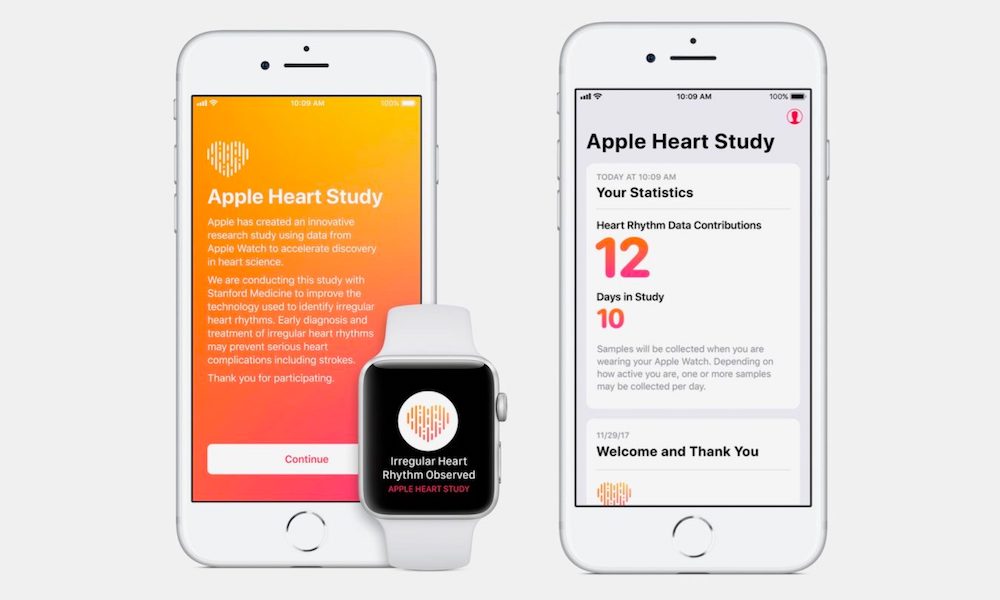Stanford Medicine Releases Results of Apple Heart Study

Toggle Dark Mode
For a little over a year now, Apple has been conducting a heart health study in partnership with Stanford University’s School of Medicine in order to determine the accuracy and application for the heart monitoring capabilities of Apple Watch, particularly when it comes to detecting atrial fibrillation (AFib) and irregular heart rhythms. Although the first phase of the study, which began in November 2017, was only open to selected applicants, Apple began actively recruiting participants a few months later, ultimately opening it to anybody who wished to participate.
Apple has now announced that Stanford Medicine has reported the results of the groundbreaking study, which included over 400,000 participants from all 50 U.S. states. Over the course of the eight-month study, Apple and Stanford worked together to evaluate the irregular rhythm notification features on the Apple Watch, which is designed to monitor the user’s heart rhythm and notify the user when an irregular heart rhythm appears that could suggest atrial fibrillation. As part of the study, participants who were identified as having irregular heart rhythms also received a telehealth consolation with a doctor and an ECG patch for additional monitoring.
We are proud to work with Stanford Medicine as they conduct this important research and look forward to learning more about the impact of Apple Watch alongside the medical community. We hope consumers will continue to gain useful and actionable information about their heart health through Apple Watch.
Jeff Williams, Apple’s Chief Operating Officer
Researchers from Stanford Medicine recently presented their findings at the American College of Cardiology’s 68th Annual Scientific Session and Expo. The results of the study revealed that only 0.5 percent of the over 400,000 participants received irregular pulse notifications — something that researchers considered important due to concerns that had been raised about false positives, or “over-notifications.”
Participants who received irregular pulse notifications were provided with an electrocardiography (ECG) patch, which revealed that the Apple Watch pulse detection algorithm to have a 71 percent “positive predictive value” — meaning that users who received an irregular hearth rhythm notification had a 71 percent chance of actually having the condition. Using the ECG patch, the study was able to determine that 84 percent of the time, participants who received an irregular pulse notification on their Apple Watch were also found to be in atrial fibrillation at the same time. Of the participants who only used the ECG patch a week after receiving an irregular pulse notification, only 34 percent were found to have atrial fibrillation, however the intermittent nature of the condition makes this result unsurprising, while also emphasizing the importance of the Apple Watch — a device that a user wears almost constantly during waking hours — at detecting atrial fibrillation.
The results of the Apple Heart Study highlight the potential role that innovative digital technology can play in creating more predictive and preventive health care. Atrial fibrillation is just the beginning, as this study opens the door to further research into wearable technologies and how they might be used to prevent disease before it strikes — a key goal of precision health.
Lloyd Minor, MD, Dean of the Stanford School of Medicine
It’s also worth noting that the study did not include the Apple Watch Series 4, as that model had not been released at the time of the study, so Apple’s more advanced ECG feature was not in play. Participants could use an Apple Watch Series 1, Series 2, or Series 3 with the latest version of watchOS 4 installed, although it is unclear if any of the study participants updated to watchOS 5 during the course of the study, or were permitted to do so.
Ultimately, the Apple Heart Study confirms what we’ve already been seeing from numerous real-world reports — that the Apple Watch can save lives by providing early detection of heart conditions. However, the degree of accuracy revealed by the study, and in particular the positive predictive value, should encourage Apple Watch users who receive irregular heart rhythm notifications to schedule a visit with their doctor to confirm whether a heart condition like atrial fibrillation exists. AFib is the leading cause of stroke and is responsible for 130,000 deaths and 750,000 hospitalizations in the U.S. every year, and the condition very often goes undiagnosed by medical professionals.






